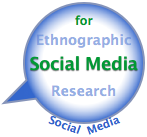 Ethnographic research for cross border business shows how to apply ethnographic research of social media to reducing the risks and costs of doing cross border business and deals. Ethnographic research can transform the value proposition of international business because it’s a very efficient way to conduct due diligence, to study the behavior and motivations of the people that the deal proposes to serve. Unlike traditional research methods, which are relatively slow, costly and qualitative, ethnographic research of social media combines qualitative richness with quantitative analysis. It’s faster and less costly, too. Ethnographic research for cross border business shows how to apply ethnographic research of social media to reducing the risks and costs of doing cross border business and deals. Ethnographic research can transform the value proposition of international business because it’s a very efficient way to conduct due diligence, to study the behavior and motivations of the people that the deal proposes to serve. Unlike traditional research methods, which are relatively slow, costly and qualitative, ethnographic research of social media combines qualitative richness with quantitative analysis. It’s faster and less costly, too.
Ethnographic research for cross border business can dramatically improve the depth and breadth of research for business and corporate strategy, market entry strategy, customer development, human capital strategy, product management, and others since it allows teams to consider more users and to assess their behavior and motivations, which can improve the value of more costly research.
Imagine that you can get deep qualitative and quantitative data on what your proposed clients, customers, employees and partners are discussing among themselves, specifically about the business scenario you propose to address. Ethnographic allows you to validate, with real people, […]
 Customer experience and experiential social media shows how you can succeed in transforming your customers’ experiences with your firm by adopting a refreshing and effective human approach. Transforming customer experience enables most firms to become more resilient and profitable. Customer experience and experiential social media shows how you can succeed in transforming your customers’ experiences with your firm by adopting a refreshing and effective human approach. Transforming customer experience enables most firms to become more resilient and profitable.
If you’d like to watch this post instead of reading it, click the thumbnail button.
[…]
 Customer success and experiential social media identifies three pitfalls that too often prevent customer success initiatives from attaining their potential for improving customer experience. In case you’re not familiar with the customer success movement, I outline its origins and scope, so you can appreciate the pitfalls and avoid them. Customer success and experiential social media identifies three pitfalls that too often prevent customer success initiatives from attaining their potential for improving customer experience. In case you’re not familiar with the customer success movement, I outline its origins and scope, so you can appreciate the pitfalls and avoid them.
If you’d like to watch this post instead of reading it, just click its thumbnail.
[…]
 Ethnographic research for design explains how to use advances in ethnographic research of social media to design products, services, experiences… anything—while getting better results at lower risk. Ethnographic research of social media is breakthrough for designers in the “design stack” in which I’ve includedArchitecture/Interior Design, Product Design, User Experience Design/Interaction Design, UX Strategy, Service Design and Customer Experience Design. Ethnographic research for design explains how to use advances in ethnographic research of social media to design products, services, experiences… anything—while getting better results at lower risk. Ethnographic research of social media is breakthrough for designers in the “design stack” in which I’ve includedArchitecture/Interior Design, Product Design, User Experience Design/Interaction Design, UX Strategy, Service Design and Customer Experience Design.
Designers in all fields lament clients’ resistance to funding robust research. Traditional design research methods are often grounded in asking proposed users explicit questions, and self-reported responses vary significantly from actual behavior despite respondents’ best intentions. Similarly, shadowing, service safaris, “a day in the life,” and other analog research methods are costly and slow. Sample sizes are necessarily small because scaling analog methods greatly multiplies the budget and length of the research phase. Ethnographic research of social media changes the game because it studies proposed users’ actual behavior in digital public when they’re having heated discussions about the outcomes they want when the proposed product, service, or process is useful to them. It […]
 Ethnographic research for social media initiatives shows how ethnography can change the rules of social media programs in marketing, customer service, product development, recruiting and others. Ethnographic research enables teams to understand the people who are most important to your firm so they can relate to them at a completely different level. Moreover, interacting in digital public activates the network effect and the annuity effect, so it’s very scalable. Since your teams interact in digital public, where a far larger group of like people observes the interactions, they influence a large group of people and build relationships with them. People start trusting your firm, preferring your firm, and doing more business with you. See the Trust Business Chain Reaction and infographic for how it monetizes. Ethnographic research for social media initiatives shows how ethnography can change the rules of social media programs in marketing, customer service, product development, recruiting and others. Ethnographic research enables teams to understand the people who are most important to your firm so they can relate to them at a completely different level. Moreover, interacting in digital public activates the network effect and the annuity effect, so it’s very scalable. Since your teams interact in digital public, where a far larger group of like people observes the interactions, they influence a large group of people and build relationships with them. People start trusting your firm, preferring your firm, and doing more business with you. See the Trust Business Chain Reaction and infographic for how it monetizes.
Ethnographic research for social media initiatives is a game-changer for customer experience and digital transformation programs in multiple phases. It’s faster, less costly, and scalable. It provides an unprecedented combination of qualitative and quantitative research.
[…]
 Ethnographic research for product management shows how to apply ethnographic research of social media to managing the life cycle of products and services. Ethnographic research of social media can revolutionize product management because it’s a very efficient way to study people’s behavior and motivations in each part of the product life cycle. Unlike traditional product and ethnographic research methods, which are relatively slow, costly and qualitative, ethnographic research of social media combines qualitative richness with quantitative analysis. It’s faster and less costly, too. Ethnographic research for product management shows how to apply ethnographic research of social media to managing the life cycle of products and services. Ethnographic research of social media can revolutionize product management because it’s a very efficient way to study people’s behavior and motivations in each part of the product life cycle. Unlike traditional product and ethnographic research methods, which are relatively slow, costly and qualitative, ethnographic research of social media combines qualitative richness with quantitative analysis. It’s faster and less costly, too.
This post outlines the product management use case of ethnographic research of social media. For more on ethnographic research, see its executive summary.
[…]
How Social Technologies Have Disrupted Organizations is a quick overview of the business and social environment around commercial, government and nonprofit organizations that sets the context for using social business for digital transformation.
![How Social Technologies Have Disrupted Organizations [CDO Guide to Social Business Preview]](http://rollyson.net/wp-content/uploads/2013/06/CDO_socbus_pre_main2.png) [UPDATED] Social technologies are quickly changing the context around why people buy products and services. Leaders of organizations in business, government and nonprofit sectors harbor a false assumption that is becoming lethal in the digital social age: they assume that products and services have inherent value to customers and constituents. In fact, products and services represent costs to customers and revenue to producers and service providers. [UPDATED] Social technologies are quickly changing the context around why people buy products and services. Leaders of organizations in business, government and nonprofit sectors harbor a false assumption that is becoming lethal in the digital social age: they assume that products and services have inherent value to customers and constituents. In fact, products and services represent costs to customers and revenue to producers and service providers.
Customers must use products or services to create outcomes that are personally or professionally meaningful. The use of the product or service is where the customer or constituent produces value. This is why they buy. “So what,” you might be thinking. In this post I’ll show how digital social technologies are weakening mediocre products and services and how organizations can use social business to strengthen their offerings. Read a more in-depth treatment in […]
|
|
 Ethnographic research for cross border business shows how to apply ethnographic research of social media to reducing the risks and costs of doing cross border business and deals. Ethnographic research can transform the value proposition of international business because it’s a very efficient way to conduct due diligence, to study the behavior and motivations of the people that the deal proposes to serve. Unlike traditional research methods, which are relatively slow, costly and qualitative, ethnographic research of social media combines qualitative richness with quantitative analysis. It’s faster and less costly, too.
Ethnographic research for cross border business shows how to apply ethnographic research of social media to reducing the risks and costs of doing cross border business and deals. Ethnographic research can transform the value proposition of international business because it’s a very efficient way to conduct due diligence, to study the behavior and motivations of the people that the deal proposes to serve. Unlike traditional research methods, which are relatively slow, costly and qualitative, ethnographic research of social media combines qualitative richness with quantitative analysis. It’s faster and less costly, too.
 Customer experience and experiential social media shows how you can succeed in transforming your customers’ experiences with your firm by adopting a refreshing and effective human approach. Transforming customer experience enables most firms to become more resilient and profitable.
Customer experience and experiential social media shows how you can succeed in transforming your customers’ experiences with your firm by adopting a refreshing and effective human approach. Transforming customer experience enables most firms to become more resilient and profitable. Customer success and experiential social media identifies three pitfalls that too often prevent customer success initiatives from attaining their potential for improving customer experience. In case you’re not familiar with the customer success movement, I outline its origins and scope, so you can appreciate the pitfalls and avoid them.
Customer success and experiential social media identifies three pitfalls that too often prevent customer success initiatives from attaining their potential for improving customer experience. In case you’re not familiar with the customer success movement, I outline its origins and scope, so you can appreciate the pitfalls and avoid them. Ethnographic research for design explains how to use advances in ethnographic research of social media to design products, services, experiences… anything—while getting better results at lower risk. Ethnographic research of social media is breakthrough for designers in the “design stack” in which I’ve includedArchitecture/Interior Design, Product Design, User Experience Design/Interaction Design, UX Strategy, Service Design and Customer Experience Design.
Ethnographic research for design explains how to use advances in ethnographic research of social media to design products, services, experiences… anything—while getting better results at lower risk. Ethnographic research of social media is breakthrough for designers in the “design stack” in which I’ve includedArchitecture/Interior Design, Product Design, User Experience Design/Interaction Design, UX Strategy, Service Design and Customer Experience Design. Ethnographic research for social media initiatives shows how ethnography can change the rules of social media programs in marketing, customer service, product development, recruiting and others. Ethnographic research enables teams to understand the people who are most important to your firm so they can relate to them at a completely different level. Moreover, interacting in digital public activates the network effect and the annuity effect, so it’s very scalable. Since your teams interact in digital public, where a far larger group of like people observes the interactions, they influence a large group of people and build relationships with them. People start trusting your firm, preferring your firm, and doing more business with you. See the Trust Business Chain Reaction and infographic for how it monetizes.
Ethnographic research for social media initiatives shows how ethnography can change the rules of social media programs in marketing, customer service, product development, recruiting and others. Ethnographic research enables teams to understand the people who are most important to your firm so they can relate to them at a completely different level. Moreover, interacting in digital public activates the network effect and the annuity effect, so it’s very scalable. Since your teams interact in digital public, where a far larger group of like people observes the interactions, they influence a large group of people and build relationships with them. People start trusting your firm, preferring your firm, and doing more business with you. See the Trust Business Chain Reaction and infographic for how it monetizes. Ethnographic research for product management shows how to apply ethnographic research of social media to managing the life cycle of products and services. Ethnographic research of social media can revolutionize product management because it’s a very efficient way to study people’s behavior and motivations in each part of the product life cycle. Unlike traditional product and ethnographic research methods, which are relatively slow, costly and qualitative, ethnographic research of social media combines qualitative richness with quantitative analysis. It’s faster and less costly, too.
Ethnographic research for product management shows how to apply ethnographic research of social media to managing the life cycle of products and services. Ethnographic research of social media can revolutionize product management because it’s a very efficient way to study people’s behavior and motivations in each part of the product life cycle. Unlike traditional product and ethnographic research methods, which are relatively slow, costly and qualitative, ethnographic research of social media combines qualitative richness with quantitative analysis. It’s faster and less costly, too.![How Social Technologies Have Disrupted Organizations [CDO Guide to Social Business Preview]](http://rollyson.net/wp-content/uploads/2013/06/CDO_socbus_pre_main2.png) [UPDATED] Social technologies are quickly changing the context around why people buy products and services. Leaders of organizations in business, government and nonprofit sectors harbor a false assumption that is becoming lethal in the digital social age: they assume that products and services have inherent value to customers and constituents. In fact, products and services represent costs to customers and revenue to producers and service providers.
[UPDATED] Social technologies are quickly changing the context around why people buy products and services. Leaders of organizations in business, government and nonprofit sectors harbor a false assumption that is becoming lethal in the digital social age: they assume that products and services have inherent value to customers and constituents. In fact, products and services represent costs to customers and revenue to producers and service providers.